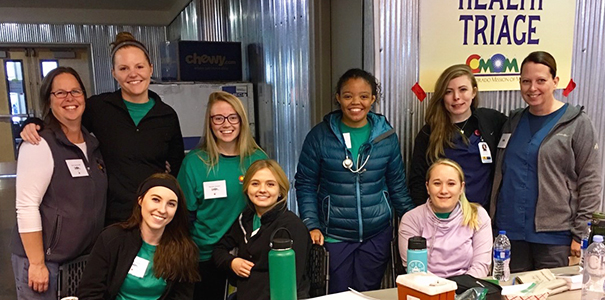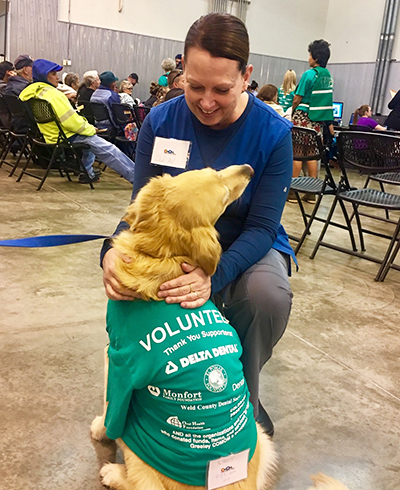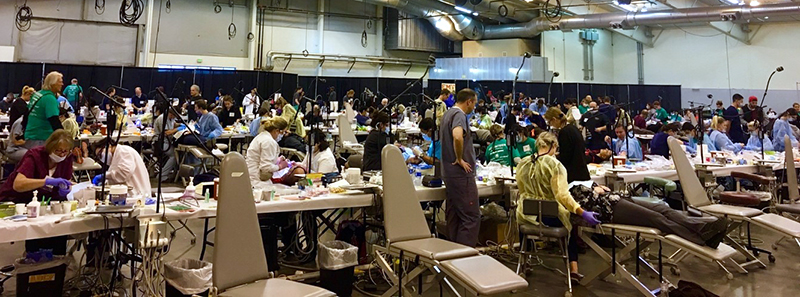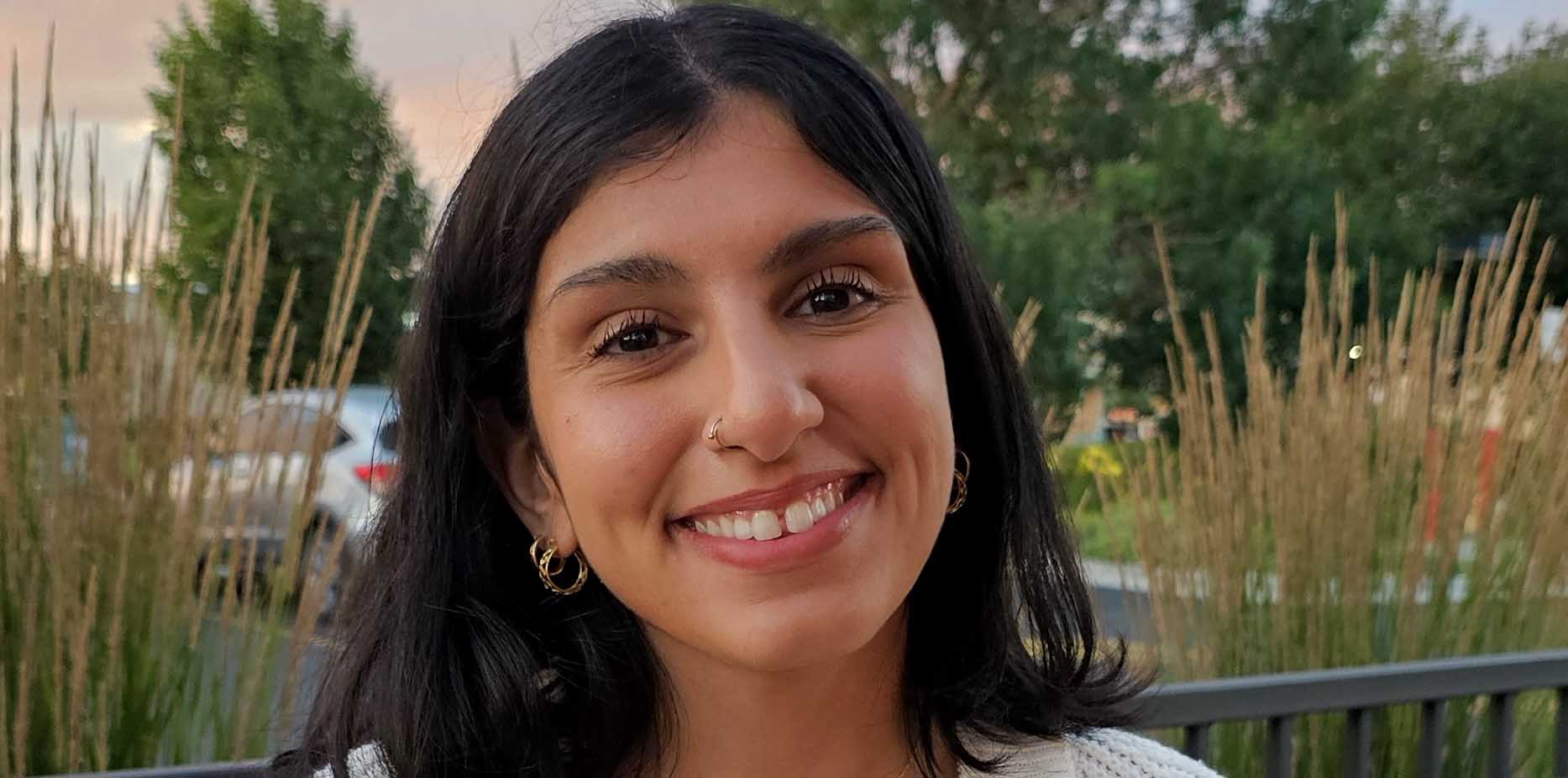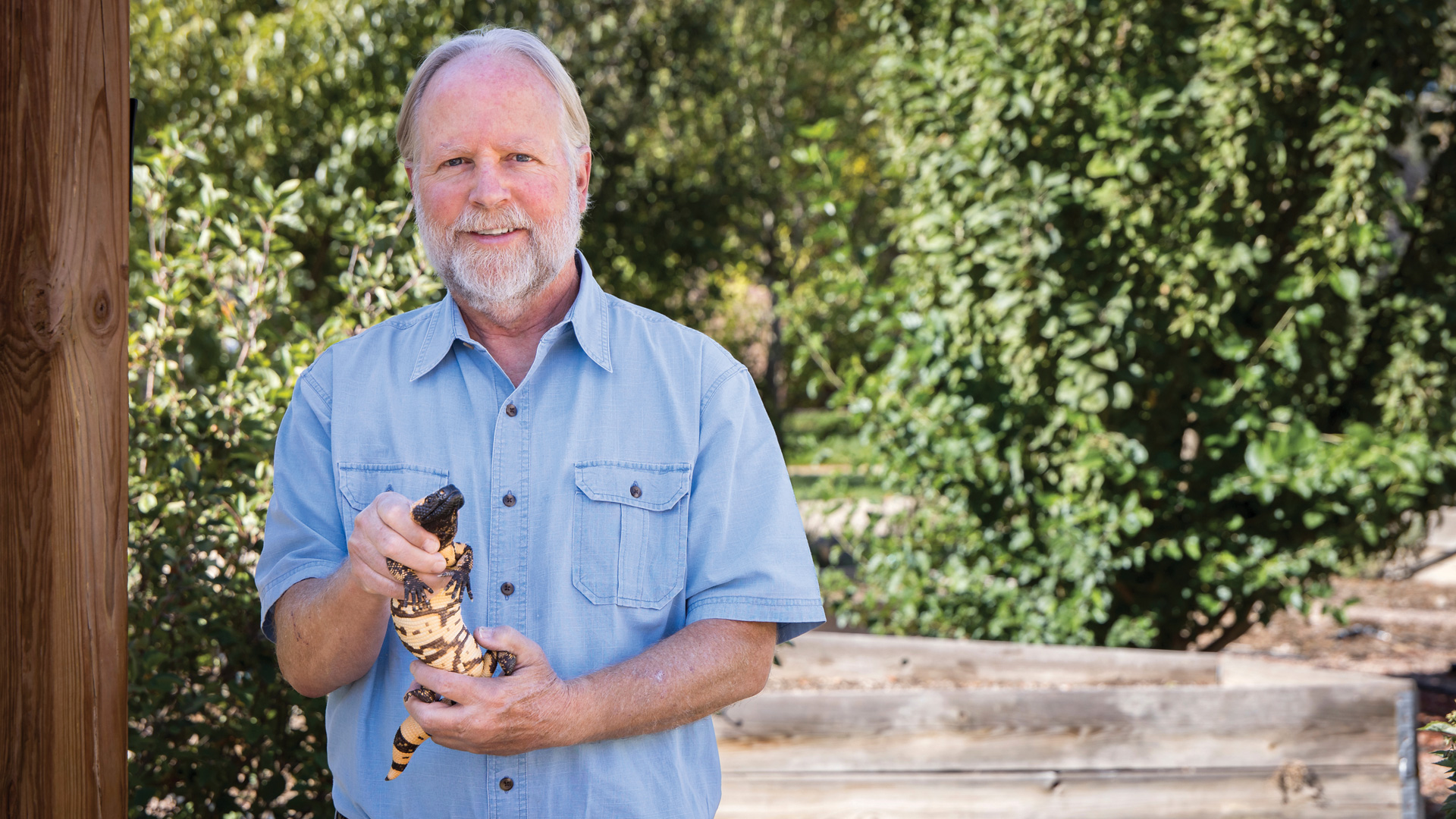Hi, I’m Katie Corder, the creative content producer at the University of Northern
Colorado. I sat down with Deb Rojas, who is an assistant professor in the UNC School
of Nursing. This semester, over 45 UNC nursing students and faculty volunteered for
a statewide initiative that provided free dental services to Colorado residents. In
this podcast, Rojas discusses the school's track record of community service and how
such service contributes to student success and the healthcare profession.
Describe why it’s important to have nursing students involved in the community.
There are community needs that are not met, or that are hard to meet, and then we
have like an entire huge group of people with a very specific skillset that can meet
that need, so putting them together is really kind of a magical thing where there
are needs in the community that can be met.
The really good feeling of going outside of your usual thing, and this is the feedback
that I get back from students, is that they get so caught up in their nursing school
bubble, which happens in life generally, anyway, or you’re just so obsessed and concerned
about your own thing that you forget that there are people out there who have fallen
through the cracks. So, putting yourself out there helps to bring a different perspective
to your own problems and your own struggles, and that’s the feedback that I get from
them.
Can you describe the Colorado Mission of Mercy event that happened in November?
The most recent event that we did was the Colorado Mission of Mercy, and that is basically
a free dental clinic that comes around every five years. They were in Greeley this
year; there’s about 125 dental chairs that are set up, 200 dentists, but up to 1,200
volunteers that come and help … just this free dental clinic, you come in, no questions
asked, they don’t look at our insurance, your income or anything, and they just provide
free dental care. So, they provided this year over $1 million in free dental care
for about 1,100 people that came in two days.
Our students in the school of nursing, we had about 45 students who went. They mostly
did health triage, so everyone that came in they had to have their blood pressure
checked, if they are diabetic, we check their blood sugar, and just some overall health
questions. We would clear them basically to go and see the dentists.
They also did immunizations with the health department who was there, and then, the
earlier students helped with registration. Just helping people get people in the doors,
some of them were Spanish speakers and were able to help with interpretation, so a
variety of things, but we were there for two full days.
There are two other annual events the School of Nursing is involved in: one in the
spring called the 9Health Fair and one in the fall called Project Connect. Can you
describe what goes on at those events and how nursing students are involved?
Well, the next big event really that we’re doing, and we’ve already started preparing
for it is the 9Health Fair that we do every year. Five to six years ago, in 2013,
we decided that we were going to bring the Greeley fair to UNC.
Since 1980, they’ve served almost two million people. Lots of really good health services
there. Our nurse practitioners, also we have a nurse practitioner program, they are
really the ones who do the bulk of our screenings. I coordinate with our nurse practitioner
faculty, and those students do pap smears, breast exams, skin assessments, prostate
exams, a variety of screenings, and then we have a chiropractor that comes every year.
Audiology comes every year, the School of Audiology, and over the last couple of years,
the School of Nutrition and Dietetics has been hugely involved. And there’s so many
stations, things that they can do with diabetic teaching, height, weight and BMI,
and just a bunch of those kinds of screenings, nutritional focus. And we’re looking
at this year incorporating more of the speech and language pathology and students.
I’ve already started discussions with them because they can do so screenings, too.
We have a wellness zone, which is really great. We have things like massage, aroma
therapy, anything that would be considered a complementary therapy. In the last several
years, we’ve done a kid zone, which is crazy, but it’s a lot of fun. Any of our students
who are in the pediatric rotation manage the kid zone.
The big focus for us, for the students is that I want them working with an interdisciplinary
team, so they get to work with the nutrition students and the dietetic students and
the chiropractor and the audiology students. Understanding all those different disciplines.
The big focus of course is doing a service for the community, so I have a lot of community
members that are volunteers also, so they’re working with the community to put on
the event. It’s a huge service to the community, we have people that come back every
year.
The other thing we’ve really focused on is creating a culture of inclusion at the
fair, so that we always have interpreters there. We talk to the different cultural
centers and try to get interpreters at the fair so that we can make sure that anyone
that comes is going to feel like this is a place where you can get health information,
you can get screenings and you’re going to be treated with respect regardless of who
you are or what you believe, you can come here.
Our three main focuses:
1. Serve the community
2. Work with interdisciplinary teams and
3. Create a culture of inclusion
And what’s the other annual event?
In the fall, and this started in 2013 also when we started working with the Weld County
United Way. They’re the ones who host the Project Connect. It’s at the Island Grove
event center. It’s always in the fall. The difference between Project Connect and
the 9Health Fair, is that the 9Health Fair is all health, where Weld Project Connect
has a health section, but it has a whole bunch of other stuff.
Somebody can get like a free haircut, they have a municipal court, they have things
for kids, there’s a big foot-washing station. They get free socks, there’s huge, huge
number of services. We have the health services, which is kind of a subsection of
that, but we’ve been doing that since 2013. Our students there do a lot of the same
kinds of screenings that they would do at the Health Fair. They do blood pressure,
height, weight and body mass index, they might do some glucose testing, the Health
Department is always there doing immunizations and flu shots.
They have a big foot-washing station. It just is a nice way for them to connect with
somebody in a different way. People come in there, a lot of times homeless or near
homeless, and they come, and the students wash their feet, and they just treat them
like they’re important. The people who are getting the treatment say it’s been a long
time since anybody’s treated me that way. People don’t even usually talk to me or
whatever. So, that acknowledgement of that individual. And students have found that
to be a very powerful experience even more than the blood pressures and all that stuff.
Initially, we had to talk them into the foot washing, and now we have people who are
fighting over the foot washing because it’s such a powerful thing to do.
Then after they get their feet washed, they go to the pediatrist, they get new socks,
so it’s a whole area of Project Connect. This year we had 90 students go, which is
more than usual. Last year we had 60. This year we had 90, so the other role that
they take on is navigators. So, at Project Connect, every person who comes is assigned
a navigator. So, the navigator has a list of everything that’s available at the event,
and they help the person walk through and navigate the event. To just spend maybe
two hours with one person or one family and really get their story and why they’re
there and why they need that service — that is a tremendously valuable thing.
And then we also will, a lot of times, take some of our nurse practitioners there.
It’s like an ‘ask-a-nurse’ station, so the students can come, they get their basic
health screenings with our undergraduates, and then the nurse practitioners students
help talk to people about their medications, any health problems that they have, help
them get referrals, and that sort of thing. That’s what we do at Project Connect.
Are there any other community events that School of Nursing is involved in outside
of the ones we discussed?
We have a small group every year that works with the Boy Scouts in this area. They
help the Boy Scouts get their first aid merit badge, so they go and spend two days
with them and teach them first aid and CPR, and then they can get their merit badge
and so that’s something we do every year now. We call it the Merit Badge University.
We send maybe 12, 13, 15 students every year to do the Merit Badge University. So
again, getting them connected with a specific population that it’s usually the students
who want to pediatrics that do the merit badge. There’s a variety of things that we
do, but those are the big ones.
How do nursing students feel about these events? What do they get out of these events?
I ask my students why it is important for nurses to become civically engaged. Having
an understanding and a relationship with the community as a health practitioner is
really valuable also knowing what’s available in the community for your patients,
so you can say go to the 9Health Fair, you can get this lab work for a lot less money.
That’s really valuable. Having that creates a lot of empathy for the student where
they are able to get the person’s story and to understand why isn’t this person fulfilling
their blood pressure prescription? It’s hard for students to understand that some
people legitimately don’t have $5 even to go and get their blood pressure medication
filled, but once they spend some time with them and get their story then it helps
them have a better understanding. Understanding different cultures, understanding
people who are kind of conditioned to believe different realities than what you have
been conditioned to believe, I think is really valuable for nurses, helping to engage
in different populations.
Interacting with the public, being able to see what their needs are, this one student,
I love this quote, she said, “I never felt like a superhero until I was swarmed by
a group of children who wanted to know everything about what I do.”
I’m like, “Wow, we’re creating superheroes, I didn’t even know we were doing that.”
For her, it was like I have so much more confidence now going forward, now that I’ve
done this really great thing.
One student said, “We’re in a unique and special position to affect change that matters.
It’s an honor and a privilege.” And many students will talk about impact, like where
they see themselves as privileged to have the education, the knowledge and the skill
that they have. Now we can make change that has a real impact on the community, and
I think they get that. They really understand that that’s why we’re sending them out
there.
For prospective students interested in pursuing nursing, what makes UNC’s School of
Nursing unique?
We have a very collegial relationship with our students. Once you’re ours, once you’re
in our program, we do everything that we can do to see you finish the program. We
are not a huge school, we’re small enough that we all know each other, we work really
hard, we work in great teams together, and I think we have created this culture of
very strong, collegiality among the faculty but also with the students.
